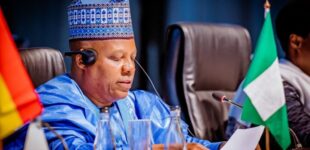N5,000 for subsidy removal: Robbing Nigerians to pay Nigerians

“The subsidy regime in the [oil] sector remains unsustainable and economically disingenuous. Ahead of the target date of mid-2022 for the complete elimination of fuel subsidies, we are working with our partners on measures to cushion the potential negative impact of the removal of the subsidies on the most vulnerable at the bottom 40% of the population. One of such measures would be to institute a monthly transport subsidy in the form of cash transfer of N5,000 to between 30 – 40 million deserving Nigerians” — These are the words of Nigeria’s minister of finance, budget, and national planning, Zainab Ahmed.
Sometimes I wonder how decision-makers in Nigeria come to conclusion on issues of national interest. Nigeria is a country with more than 200 million people cut across diverse businesses, religions, tribes, professions, beliefs, cultures, trade, financial income, and standards of living.
While I am a journalist, someone else is a medical doctor, another is a teacher. Millions are students who do menial jobs to pay school fees and other bills. Others are drivers, security guards, cooks, bricklayers, welders, vulcanizers, mechanics, hotel workers, market men and women, and lots more. Some are civil servants working in ministries, state hospitals, judiciary, government agencies, and parastatals.
We live in the same country, we patronise the same open market for groceries, ply the same roads, breathe the same air, and are under the same threat of insecurity. But our income differs, so different that even if we work in the same organisation, we are most likely not going to be paid the same exact compensation as monthly salary.
This difference in income is the major determiner of what makes our individual lives different. It is what makes Mr A send his children to a school where he pays N500,000 per term, while Mr B sent his own kids to a school he pays N50,000 per term. It is the difference that makes Tolulope able to afford rent in Ikoyi while Ndubuisi can only afford the same type of apartment in Ikorodu. This difference is not one that should be taken with kid gloves, it must be considered in every decision-making meeting at all government levels.
This is why I am often bewildered when the government of the day comes up with policies, most of which they do out of their air-conditioned offices, bulletproof cars, or protected houses without considering the man who treks 30 minutes to work and back every day, not because he wants to exercise, but because he can’t afford the transport fare, he feeds once in a day, not because he is fasting but because he cannot afford three meals a day.
Almost everything in Nigeria is tied around petrol. Prices of foodstuffs, in fact, prices of everything are determined by the price of fuel. Once fuel price is increased, it affects every other part of human lives. Why then does the federal government who are in the position to cushion the effect of this anomaly, be the architect of it? This really baffles me.
Nigeria is still battling with its worst insecurity challenges since the civil war, food production has dropped drastically because some of our farmers and their families have been killed, the ones still alive with their feet and arms yet to be cut off by killer bandits and herdsmen, have been sent away from the farm. They are afraid to return to their profession for fear of being killed. The consequence of this is the shortage of food items and inflated prices.
While Nigerians are suffering an increase in food prices caused by insecurity, the weak value of the naira has made things worse for the urban residents. The persistent weakness of the naira and its poor exchange rate to the dollar and other international currencies has affected cross-border purchases and businesses and continues to push inflation off the roof.
The world, Nigeria inclusive, is still struggling to defeat coronavirus, a pandemic that led to the loss of jobs, reduction of salary, folding up of businesses, and many other personal losses. Some people are yet to secure another job, some businesses will never come back, and some companies have continued to downsize. How can you then be talking about fuel subsidy removal? To further damage the already poverty-stricken population of the country and think N5,000 can fix it?
N5,000 monthly for 30-40 million poorest Nigerians is the laziest solution the federal government could profer to the biting economic hardship Nigerians are already subjected to. It is like taking the livelihood of someone and giving them a meal in replacement. It is really a penny-wise-pound foolish gamble plan.
N5,000 transport fare cannot solve the damaging effect of N340 per litre of fuel. It is a poorly-thought plan that does not portray the interest of the common man. It is draconian, anti-people, and unacceptable, at least for now.
Expectedly, the Nigerian Labour Congress has condemned the planned increase, and timely so. In a statement, its president, Ayuba Wabba said “the contemplation by the government to increase the price of petrol by more than 200 percent is a perfect recipe for an aggravated pile of hyper-inflation and astronomical increase in the price of goods and services”.
“This will open a wide door to unintended social consequences such as degeneration of the current insecurity crises and possibly citizens’ revolt. This is not an outcome that any sane Nigeria wishes for,” Wabba said. We all remember the #OccupyNigeria protest of 2012, and the #EndSARS protest of 2020, the government should avoid pushing its citizenry to the wall.
There is a way out, since the full reactivation of the four public refineries in the country, and the completion and coming on stream of the three private refineries under construction in 2022, would significantly boost contribution from the sector to our economic growth efforts as said by the finance minister, then the government should not be in a rush to remove fuel subsidy? The government must first get the four Nigerian refineries up and running for over one year before talking about removing subsidy completely.
In addition, I have a better solution. Instead of increasing fuel price to N340 and paying 30-40 million Nigerians N5,000 transport fare, the government should be removing N5,000 monthly from the salary of every working Nigerian collecting N50,000 and above, and reduce petrol price to N100 per litre. It is a fair deal. I am willing to sacrifice N5,000 monthly to make life bearable for millions of others.
Israel is a Nigerian journalist and can be reached via [email protected]
Views expressed by contributors are strictly personal and not of TheCable.

















There are no comments at the moment, do you want to add one?
Write a comment